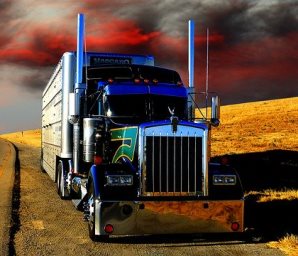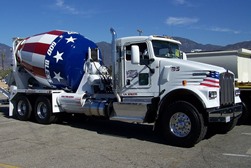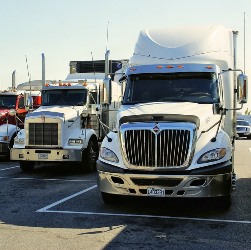How to Select the Best Trucking Classes near Denver Colorado
 Congrats on your decision to become a trucker and enroll in a CDL school near Denver CO. Maybe it has always been your fantasy to hit the open road while driving a huge tractor trailer. Or maybe you have done some analysis and have found that a career as a truck driver offers excellent pay and flexible work prospects. No matter what your reason is, it's essential to receive the proper training by picking the right CDL school in your area. When assessing your options, there are certain factors that you'll need to examine before making your final selection. Location will no doubt be an issue, particularly if you need to commute from your Denver residence. The cost will also be of importance, but picking a school based solely on price is not the ideal means to ensure you'll receive the appropriate education. Don't forget, your objective is to learn the skills and knowledge that will allow you to pass the CDL exams and become a qualified truck driver. So keeping that target in mind, just how do you choose a truck driving school? The answer to that question is what we are going to cover in the rest of this article. But first, we are going to talk a little bit about which commercial driver's license you will eventually need.
Congrats on your decision to become a trucker and enroll in a CDL school near Denver CO. Maybe it has always been your fantasy to hit the open road while driving a huge tractor trailer. Or maybe you have done some analysis and have found that a career as a truck driver offers excellent pay and flexible work prospects. No matter what your reason is, it's essential to receive the proper training by picking the right CDL school in your area. When assessing your options, there are certain factors that you'll need to examine before making your final selection. Location will no doubt be an issue, particularly if you need to commute from your Denver residence. The cost will also be of importance, but picking a school based solely on price is not the ideal means to ensure you'll receive the appropriate education. Don't forget, your objective is to learn the skills and knowledge that will allow you to pass the CDL exams and become a qualified truck driver. So keeping that target in mind, just how do you choose a truck driving school? The answer to that question is what we are going to cover in the rest of this article. But first, we are going to talk a little bit about which commercial driver's license you will eventually need.
Which Commercial Drivers License Is Required?

To drive commercial vehicles legally within the United States and Denver CO, a driver must attain a CDL (Commercial Driver's License). The 3 classes of licenses that one can apply for are Class A, Class B and Class C. Given that the subject of this article is how to select a truck driver school, we will focus on Class A and Class B licenses. What distinguishes each class of CDL is the type of vehicle that the driver can operate in addition to the GVWR (Gross Vehicle Weight Rating) or GCWR (Gross Combination Weight Rating). Below are short descriptions of the two classes.
Class A CDL. A Class A Commercial Drivers License is required to drive any vehicle that has a GCWR of greater than 26,000 lbs., including a towed vehicle of more than 10,000 lbs. A few of the vehicles that operators may be able to drive with Class A licenses are:
- Interstate or Intrastate Tractor Trailers
- Trucks with Double or Triple Trailers
- Tanker Trucks
- Livestock Carriers
- Class B and Class C Vehicles
Class B CDL. A Class B Commercial Drivers License is needed to drive single vehicles having a GVWR of more than 26,000 lbs., or a GCWR of more than 26,000 lbs. including a towed vehicle weighing up to 10,000 lbs. Some of the vehicles that drivers may be qualified to operate with Class B licenses are:
- Tractor Trailers
- Dump Trucks
- Cement Mixers
- Large Buses
- Class C Vehicles
Both Class A and Class B Commercial Drivers Licenses might also require endorsements to drive certain types of vehicles, such as school or passenger buses. And a Class A license holder, with the appropriate required endorsements, can operate any vehicle that a Class B licensee is authorized to drive.
How to Research a Trucker School

As soon as you have determined which CDL you would like to pursue, you can start the undertaking of assessing the Denver CO truck driving schools that you are considering. As earlier discussed, cost and location will no doubt be your initial concerns. But it can't be stressed enough that they should not be your only concerns. Other issues, such as the experience of the instructors or the reputations of the schools are similarly or even more important. So following are a few more points that you need to research while performing your due diligence prior to choosing, and especially paying for, your truck driver training.
Are the Schools Accredited or Certified ? Not many truck driver schools in the Denver CO area are accredited due to the demanding process and expense to the schools. However, certification is more typical and is provided by the Professional Truck Driver Institute (PTDI). A school is not obligated to become certified, but there are a number of advantages. Interested students know that the training will be of the highest quality, and that they will receive lots of driving time. For example, PTDI requires 44 hours of actual driving time, not simulations or ride-alongs. So if a school's course is certified (the course, not the school is certified), students know that the training and curriculum will fulfill the very high standards set by PTDI.
How Long in Operation? One clue to help measure the quality of a trucking school is how long it has been in business. A poorly ranked or a fly by night school typically will not be in business very long, so longevity is a plus. However, even the best of Denver CO schools had to start from their first day of training, so consider it as one of multiple qualifiers. You can also learn what the school's history is relating to successful licensing and employment of its graduating students. If a school won't share those stats, search elsewhere. The schools should also maintain relationships with regional and national trucking companies. Having numerous contacts not only points to a quality reputation within the profession, but also boosts their job assistance program for students. It also wouldn't be a bad idea to get in touch with the Colorado licensing authority to make sure that the CDL trucker schools you are reviewing are in compliance.
How Effective is the Training? As a minimum requirement, the schools must be licensed in Colorado and hire instructors that are experienced and trained. We will talk more about the teachers in the following section. Also, the student to instructor ratio should not be higher than 4 to 1. If it's any greater, then students will not be receiving the personalized instruction they will need. This is particularly true regarding the one-on-one instruction for behind the wheel training. And look out for any school that insists it can teach you to drive trucks in a comparatively short time frame. Learning to be an operator and to drive a tractor trailer professionally takes time. The majority of Denver CO schools provide training courses that run from 3 weeks to as long as 2 months, depending on the license class or kind of vehicle.
How Good are the Instructors? As already mentioned, it's imperative that the instructors are trained to teach driving techniques and experienced as both instructors and drivers. Even though several states have minimum driving time criteria to be certified as an instructor, the more successful driving experience a teacher has the better. It's also important that the teachers keep up to date with industry developments or any new regulations or changes in existing laws. Evaluating instructors may be a little more subjective than other standards, and possibly the ideal method is to check out the school and speak with the teachers face to face. You can also speak with some of the students going through the training and ask if they are happy with the quality of instruction and the teacher's ability to train them.
Sufficient Driving Time? Most importantly, a good truck driving school will furnish lots of driving time to its students. After all, isn't that what it's all about? Driving time is the actual time spent behind the wheel operating a truck. While the use of simulators and ride-a-longs with other students are necessary training methods, they are no substitute for real driving. The more instruction that a student gets behind the wheel, the better driver he or she will be. And even though driving time fluctuates among schools, a reasonable benchmark is a minimum of 32 hours. If the school is PTDI certified, it will provide at least 44 hours of driving time. Get in touch with the Denver CO schools you are considering and ask how much driving time they provide.
Are they Independent or Captive ? It's possible to get free or discounted training from a number of truck driving schools if you enter into an agreement to drive for a specified carrier for a defined period of time. This is referred to as contract training, and the schools that offer it are called captives. So rather than maintaining associations with many different trucking lines that they can refer their students to, captives only work with one company. The tradeoff is receiving less expensive or even free training by surrendering the flexibility to initially be a driver wherever you have an opportunity. Clearly contract training has the potential to limit your income prospects when starting out. But for some it may be the only way to obtain affordable training. Just make sure to ask if the Denver CO schools you are looking at are independent or captive so that you can make an informed decision.
Offer CDL Testing Onsite? There are a number of states that will permit 3rd party CDL testing onsite of truck driver schools for its graduates. If onsite testing is available in Colorado, find out if the schools you are considering are DMV certified to provide it. One advantage is that it is more convenient than battling with graduates from other schools for test times at Colorado testing locations. It is moreover an indication that the DMV views the approved schools to be of a superior quality.
Are the Class Times Convenient? As earlier noted, CDL training is only about one to two months long. With such a short term, it's essential that the Denver CO school you enroll in offers flexibility for both the scheduling of classes and the curriculum. For example, if you're having difficulty learning a particular driving maneuver, then the instructor should be prepared to spend more time with you until you have it mastered. And if you're still holding a job while going to training, then the class scheduling must be flexible enough to fit in working hours or other commitments.
Is Job Assistance Provided? The moment you have attained your CDL license after graduating from trucking school, you will be keen to start your new career. Verify that the schools you are looking at have job placement programs. Find out what their job placement ratio is and what average salary their graduates start at. Also, ask which national and local trucking companies their graduates are referred to for hiring. If a school has a low job placement rate or few Denver CO employers recruiting their grads, it might be a clue to search elsewhere.
Is Financial Assistance Offered? Trucking schools are comparable to colleges and other Denver CO area technical or vocational schools when it comes to loans and other forms of financial assistance being available. Ask if the schools you are examining have a financial assistance department, or at least someone who can help you get through the options and forms that need to be completed.
Learn More About Denver Trucker Schools
Enroll in the Right Denver CO CDL Driver Training
Picking the right truck driving school is an essential first step to launching your new vocation as a local or long distance truck driver. The skills taught at school will be those that forge a new career behind the wheel. There are a number of options offered and understanding them is critical if you are going to succeed as an operator. However, you must obtain the proper training in order to operate a big commercial vehicle in a safe and professional fashion. If you are short on cash or financing, you might want to look into a captive school. You will pay a lower or in some cases no tuition by agreeing to drive for their contracted carrier. Or you can enroll in an independent CDL school and have the the freedom to drive for the trucking company of your choice, or one of many affiliated with the school. It's your choice. But regardless of how you get your training, you will soon be joining an industry that helps our country move as a professional trucker in Denver CO.
